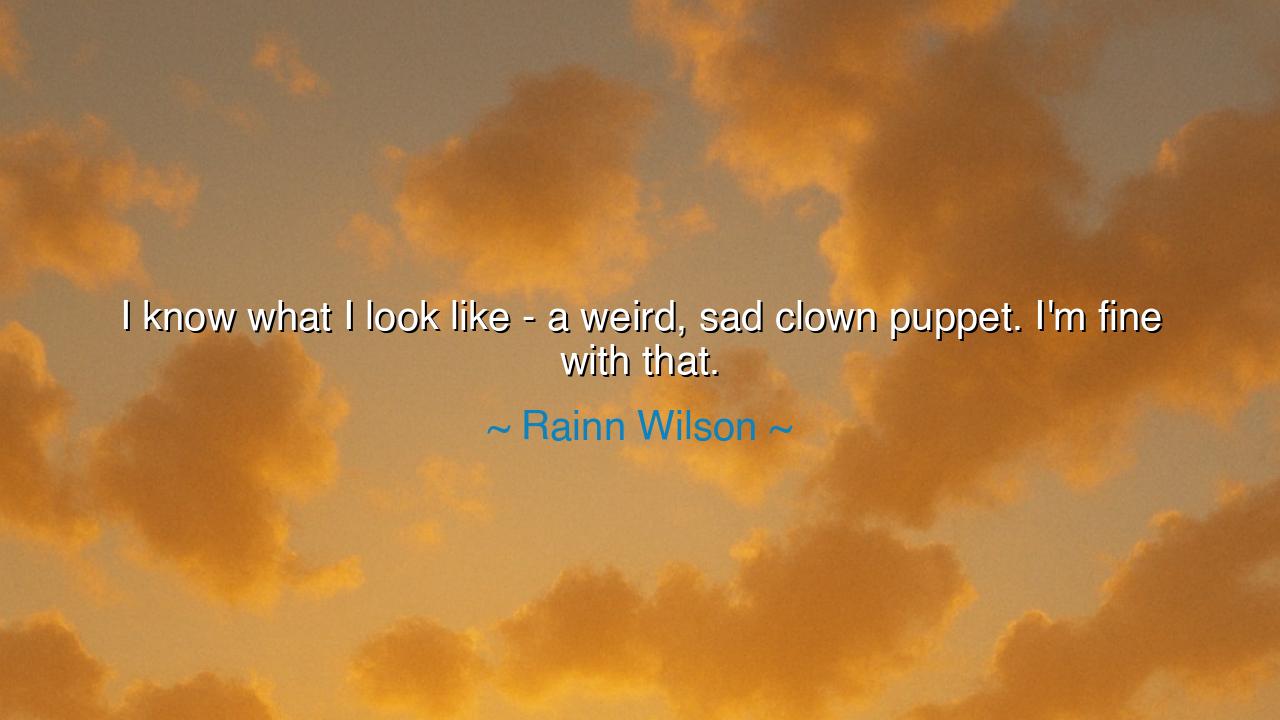
I know what I look like - a weird, sad clown puppet. I'm fine






In the words of Rainn Wilson, there is a strange and powerful truth hidden beneath humor: “I know what I look like—a weird, sad clown puppet. I’m fine with that.” These words, though wrapped in jest, carry the weight of an ancient teaching: to embrace the image the world casts upon you, yet to live unbroken, unashamed, and unafraid within it. For the mask we wear in the eyes of others is but a shadow, while the soul within is the flame that endures.
The ancients taught that the fool and the clown were not merely figures of mockery, but vessels of wisdom. The clown, painted with sorrow and laughter, reveals truths others dare not speak. He is the mirror of society, showing humanity its absurdity while cloaking his revelations in jest. Rainn Wilson, who once embodied Dwight Schrute—the odd, awkward figure of comedy—knows the burden and the power of such a role. To look like a sad puppet is to bear the gaze of the world’s laughter, but to say “I’m fine with that” is to wield strength greater than the laughter itself.
Consider the tale of Diogenes the Cynic, who lived in a barrel and mocked the pomp of Athens. The people saw him as mad, a strange clown of philosophy. Yet when Alexander the Great himself asked what favor he desired, Diogenes replied only, “Stand out of my sunlight.” In his apparent foolishness, he revealed wisdom sharper than a king’s sword: contentment lies not in power, but in freedom from vanity. Wilson’s quote echoes this same spirit—embracing the label of “weird” so that its sting is removed, turning ridicule into armor.
There is also a lesson here of humility. Many strive desperately to appear perfect, sculpting their bodies, their faces, their words, in fear of being seen as odd or flawed. Yet Wilson shows us that to accept one’s strangeness is liberation. The sad clown becomes not a figure of shame but of resilience; his sorrow is known, yet he performs with joy, giving laughter to others. What greater triumph is there than to transform perceived weakness into strength, to turn mockery into art?
History remembers Charlie Chaplin, the “little tramp” with oversized shoes and a bent hat, forever stumbling, forever smiling through tears. His very image was comical, pitiful, a puppet of sadness in a cruel world. Yet through this figure, he stirred the hearts of millions, bringing comfort during the Great Depression. He too understood that to look ridiculous is no curse; it is the gateway to speaking to the soul of humanity. Rainn Wilson’s words, in their humor, carry this same inheritance.
Thus, the teaching is this: accept the shape the world assigns to you, but do not let it define the fire within. If others call you strange, wear it as a crown. If they laugh, let their laughter feed your strength. The true defeat lies not in ridicule, but in self-rejection. To say “I am fine with that” is to reclaim power from the hands of mockery and place it firmly in one’s own spirit.
So let us learn to embrace our own weirdness. Each wrinkle, each scar, each awkward gesture is a mark of individuality, a seal of authenticity. Do not waste your days polishing an image for the fleeting approval of others; instead, deepen the substance of your being, so that even if the world sees you as a clown puppet, your life will shine with dignity and purpose.
For in the end, the lesson of Rainn Wilson is clear: joy is not found in appearing perfect, but in being unafraid to appear imperfect. And when you carry yourself with this courage, no laughter can wound you, no insult can bind you. You will walk as the ancients did—strange, perhaps, in the eyes of men, but free, powerful, and eternal in the truth of your own soul.






AAdministratorAdministrator
Welcome, honored guests. Please leave a comment, we will respond soon